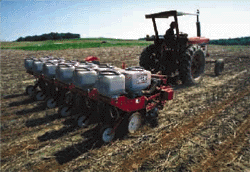“The audits and controls on sectors with high levels of labor informality allow us to dismantle maneuvers that affect the rights of male and female workers and improve the tax revenues necessary to implement public policies”indicated the head of the General Directorate of Social Security Resources of the AFIP, Carlos Castagneto.
With the incorporation of the new indicator for the primary production of and packaging of garlic, which is concentrated in Mendoza, the agency adds 92 indicators that enhance the capacity for inspection and control over agricultural, livestock, industrial and commercial sectors throughout the country.
General Resolution 5231/2022, which is published this Thursday in the Official Gazette, provides for the IMT for the primary production and packaging of garlic. The norm was articulated in conjunction with the Ministry of Labor, Employment and Social Security, the National Institute of Agricultural Technology, the National Registry of Rural Workers and Employers (Renatre), the Argentine Union of Rural Workers and Stevedores (UATRE) and the chambers businesswomen that bring together the sector.
“The minimum indicators allow us to strengthen the audits that we carry out throughout the country together with the labor portfolio. Our tools are strengthened from the work articulated with other public bodies, such as provincial labor ministries and union entities,” Castagneto said.
Among the activities carried out by IMT in the agricultural sector are the production of yerba mate, tomato, onion, potato, peach and lemon, among others.
Likewise, The indicators also cover relevant activities in the service and industry sectors such as construction, call centers, refrigerators, supermarkets, postal services, service stations, restaurants and bars.
The IMTs are used in the framework of inspections of the General Directorate of Social Security Resources of the AFIP to employers who, in the exercise of an economic activity, do not declare workers on their payroll or declare fewer than those who are actually performing tasks.
The preparation of the IMT requires the analysis of the productive and commercial process of the activity. Based on the indicator, the agency can determine contributions and contributions that correspond to workers who have fulfilled their tasks and have not been declared by their employers.
To determine the minimum number of workers required in the primary production and packing of garlic, they took into account the permanent and necessary workforce for the different stages that make up its production, depending on the hectares affected by this crop.
As part of the strategic actions promoted by the General Directorate of Social Security Resources of the AFIP to combat informal work over the last two and a half years, the agency complements the face-to-face inspections carried out on the sectors of high informality with direct inductions to employers and automated debt determination processes.
The improvement of the available tools and systems allows expanding the audited universe of employers with potential situations of irregularities and non-compliance at the national level.
The investigation and control instruments are strengthened, in turn, with the advances registered in the implementation of the Digital Salary Book, which allows employers to comply with different obligations in a single procedure, favoring paperlessness, simplifying compliance and reducing costs. .
Source: Ambito
David William is a talented author who has made a name for himself in the world of writing. He is a professional author who writes on a wide range of topics, from general interest to opinion news. David is currently working as a writer at 24 hours worlds where he brings his unique perspective and in-depth research to his articles, making them both informative and engaging.




